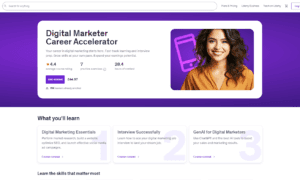Are you tired of investing time and effort into content marketing without having much to show for it? Well, you’re just one content marketing strategy away from turning things around!
With a winning content marketing strategy, you can consistently create content that attracts a flood of engaged readers, generates and converts quality leads, and boosts your brand’s visibility and credibility. It requires careful planning, a deep understanding of your target audience, and a focus on delivering value.
In this blog post, we’ll explore actionable steps and tips for creating a content strategy that will propel your marketing to new heights.
We’ll delve into the nitty-gritties of content marketing strategy, from storytelling to audience segmentation, and distribution channels.
So, are you ready to transform your content strategy into a winning formula? Let’s dive right in!”
What is a content strategy and why should you care?
In today’s digital landscape, where information overload is the norm and attention spans are shorter than ever, content strategy has become a crucial component for any business aiming to thrive in the online world. Simply churning out content without a well-defined strategy can lead to wasted efforts and missed opportunities. 80% of marketers who achieve exceptional success in content marketing have one thing in common: they possess a well-documented content strategy. Surprisingly, despite the importance of a content strategy, a significant number of content marketers still lack one in place. A staggering 57% of content marketers still do not have a content strategy in place, according to a 2021 report by Content Marketing Institute.
However, a recent survey revealed that 64% of business owners and executives now consider learning how to build a content strategy as one of their top educational needs.
If that sounds like you, we’ve got you covered. Here’s all you need to know to craft and implement that winning content strategy.
Key elements of a content strategy
These elements will guide your content creation efforts, ensure consistency, and align your content with your overall business goals.
Audience personas:
Understanding your target audience is the cornerstone of any content strategy. By creating detailed audience personas, you gain invaluable insights into their demographics, interests, pain points, and preferences.
This knowledge empowers you to tailor your content to resonate with your audience on a deeper level, forging a stronger connection with them.
Brand style and personality:
Every brand has a unique identity, and your content should reflect that. Defining your brand style and personality ensures consistency across all your content and helps you build a recognizable brand image.
Content marketing goals:
Your content marketing goals serve as the guiding principle that aligns your content efforts with your overall business objectives. Whether you aim to educate, entertain, or inspire, a clear mission ensures your content has a strategic direction.
Business case:
Building a strong business case involves establishing the potential benefits and ROI of content marketing. By illustrating the potential ROI, such as increased brand visibility, higher conversion rates, and improved customer retention, you make a persuasive case for investing in your content strategy, especially if you’re outsourcing to a content writing agency in India.
An action plan:
An action plan brings together all the other elements into a cohesive whole. It outlines the specific steps and tactics you need to reach out to your audience and achieve your marketing goals.
It includes content creation workflows, distribution channels, key performance indicators (KPIs), and a timeline.
Steps for creating a content strategy
The question now is, how do you combine all the elements above into an actionable plan and then roll it out successfully?
Here are the steps involved in creating an effective content strategy.
1. Create a goal for content marketing:
Start by setting clear and measurable goals for your content marketing efforts. Use the SMART goal framework—specific, measurable, attainable, relevant, and time-bound—to define objectives that align with your overall business goals.
For example, your goal could be to increase website traffic by 20% within six months.
2. Identify your target audience and what makes them tick:
Next, if you haven’t already done it, conduct thorough market research and develop detailed audience personas by considering demographics, interests, pain points, and preferences.
Conduct keyword research and explore online forums, social media platforms, and industry publications to understand the questions they commonly ask.
3. Determine the best content types and and topics for your marketing goals
Determine the types of content that resonate best with your audience and align with your brand. This could include blog posts, videos, infographics, podcasts, or social media content.
Also, identify high-impact topics by analyzing search trends, competitor content, and industry publications. Look for gaps in existing content and aim to provide unique perspectives or valuable insights on popular subjects.
4. Create a content calendar:
A content calendar ensures consistency, prevents last-minute scrambling, and helps you maintain a steady flow of content for your audience.
5. Plan how you will promote your content
Creating great content is only half the battle; promoting it effectively is equally crucial. Develop a promotion strategy that includes social media marketing, email marketing, influencer collaborations, and any other relevant channels to reach your target audience.
6. Track Your Results:
Whether you’re working with an in-house team or a content writing agency in India, you need to regularly monitor and measure the performance of your content marketing efforts.
Use web analytics tools to measure key metrics such as website traffic, engagement, conversion rates, and social media interactions. Adjust your strategy accordingly to optimize results over time.
Create a stand-out content marketing strategy today
A content strategy is an indispensable tool for any business looking to thrive in the digital landscape. By understanding your audience, defining your brand’s style, setting goals, and following a well-structured action plan, you can unlock the full potential of your content marketing efforts.



































